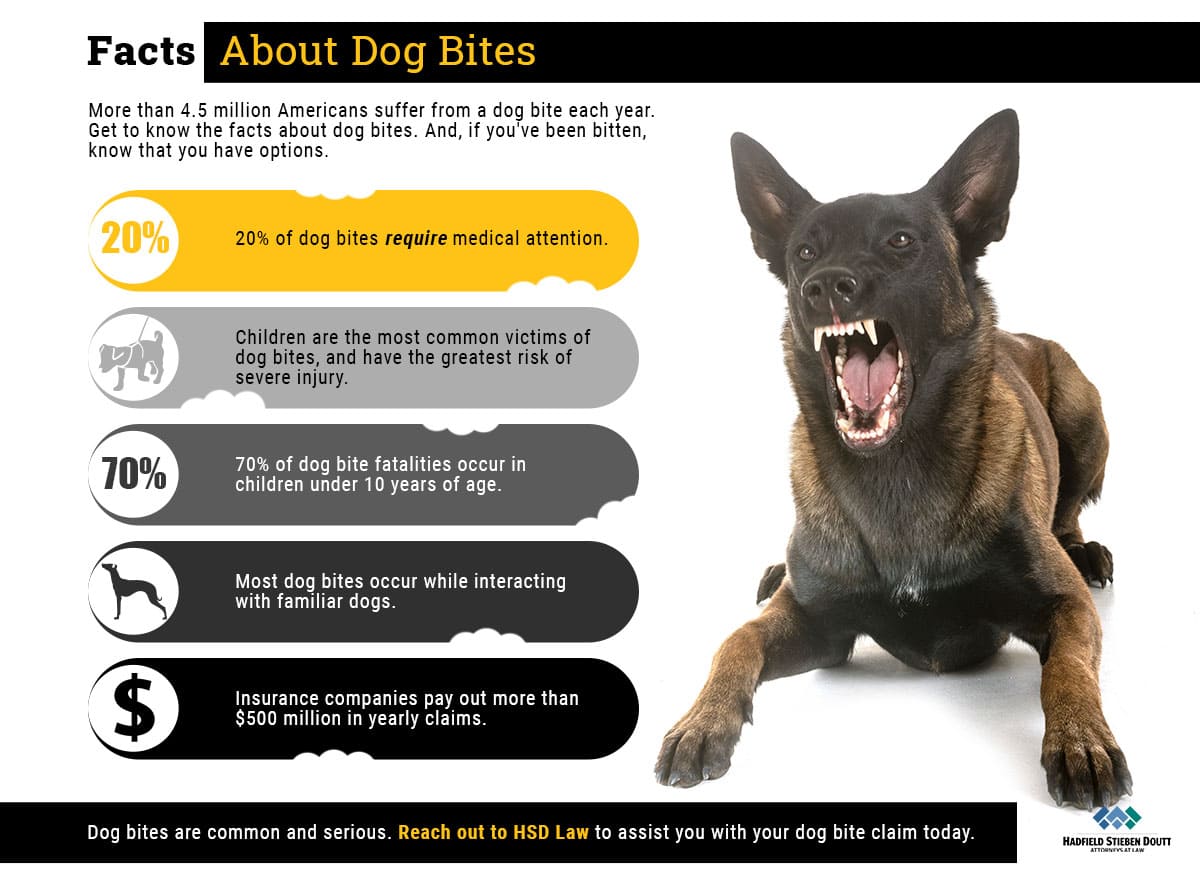Dogs make the world a better place. They are a species of mammal that has, over thousands of years, been artificially selected to be dedicated and loyal companions to humans. And it shows. There are few things in the world so immediately heartwarming as being met by the wagging tails and unabashed love of our furry friends, especially after a long day at work.
Considering how adorable, loyal, smart, and loving our dogs can be, it’s easy to forget that — just like any other animal — they can be subject to fluctuating moods, volatility, hunger, anxiety disorders, and other behaviors that can cause certain dogs, at certain times, to pose a threat to our safety.
Dog bites are a common form of injury. This should come as no surprise considering how common dogs are. It makes sense that the more we’re around dogs, the more opportunities there will be for dog bites. There are, in fact, more than 75 million dogs in the United States alone. That means there is one dog for every four people in the U.S. Two out of every five households has at least one dog as a pet. Dogs truly are humanity’s best friend. Considering this prevalence, it’s not too hard to understand why there are more than 4.5 million dog bites each year in the U.S.
Despite how common dog bites are, there are still important steps you can take to prevent these common injuries from occurring in the first place. This is vital since most dog bites are preventable. What is required is the right knowledge base and understanding of dog behavior along with community and systemic changes. That is precisely what we’ll be looking at in today’s blog. We are Northern Colorado’s trusted personal injury attorneys and we’re here to answer any questions you may have about dog bites. We can also help you with your dog bite claim. All you have to do is reach out. In the meantime, let’s take a closer look at how we can prevent dog bites in the future.
Why Do Dogs Bite?
In order to effectively prevent dog bites, it’s important to understand why they occur in the first place. Dogs will bite for a wide variety of reasons, and it’s not always easy to understand why a dog bit someone in a particular instance. Nonetheless, there are some important situations to look out for.
In general, the majority of dog bites will occur because the dog is reacting to something. While a certain amount of dog bites do occur for other reasons, it’s usually because the dog is reacting to circumstances that have driven them to feel like they need to be on the offensive. Dogs will often bite because they are scared or stressed. Just like humans or any other animals, dogs can become overwhelmed for all sorts of reasons, and this can cause them to lash out.
Similarly, dogs can bite because they are scared, because they are defending territory, because they’re not feeling well or suffering from an injury, or because they are protecting something important to them, such as their food or a beloved toy. This, again, is not that different from humans.
Another situation where a dog might bite is during play. Dogs, especially puppies, will nip and bite when they’re excited and being playful. This is normal for dogs, but it can be harmful to humans, especially young children. So, while playful nips might occur for different reasons than serious dog bites, they can still be harmful. It’s important to be mindful of this, and to prevent reinforcing nipping behaviors in puppies.
How Can I Prevent Dog Bites?
As explained, dog bites can happen for a wide range of reasons, but they are typically because the dogs are reacting to something. With this in mind, we can now turn to some of the things that can be done to help prevent dog bites from happening in the first place. We’ll address this a bit more at the end of this blog, but it’s also important to know that, if a dog bite has occurred, that you seek out any appropriate medical attention, and then discuss your options with a personal injury lawyer. Now, what can be done to prevent dog bites before they happen?
Raise Dogs Responsibly
One of the most effective and important ways to prevent dog bites is to take responsibility with our own pets. It is absolutely essential that we utilize our resources and take careful steps to raise and train our pets responsibly. Pet ownership is not something that should be entered into lightly. Like raising a child, dogs are living, breathing creatures with complex emotions and needs. People know not to jump into parenthood without preparation; the same care needs to be taken with pets.
Of course, what it means to raise a dog responsibly can vary from family to family. The needs of each dog, each family, and each situation will have to be addressed individually. Broadly speaking, however, there are some essential steps that can be taken to raise your pups with forethought. These include the following:
- Judiciously choosing when it’s the right time to get a pet
- Carefully selecting the dog that’s right for your family
- Proper training
- Regular exercise
- Neutering or spaying your pet
And this is just the tip of the tail. Seeking out education on the needs and responsibilities of pet ownership is key.
Socializing Your Pet
Socialization is a part of responsible pet ownership. However, it can be so essential to preventing dog bites that it deserves its own section. Allowing your pets the regular opportunity to get safe and diverse interactions with other people and dogs can go a long way in preventing dog bites.
Basically, socializing your pet will help them feel at ease in various social situations. When your pet feels at ease, they are less likely to feel scared, stressed, overwhelmed, protective, defensive, and all the other emotions that can trigger biting behaviors. The key to effective socialization? Starting from a young age and getting your dog comfortable in a variety of environments. Just keep in mind that, when socializing your dog, you need to take proper precautions for the safety of everyone involved. This includes following all leash laws in your area. Even if the leash laws are loose, it’s a good idea to keep your dog on a leash while they are learning to socialize.
Avoiding Risky Situations
Most dog bites actually occur from dogs with which we have some familiarity. It’s easy to imagine most dog bites occurring from strange, rabid dogs loose in the streets. However, this is comparatively rare. The reality is much more humdrum: dog bites tend to come from dogs we know. Even still, there are important steps we can take to avoid risky situations, which can include caution around strange dogs as well as familiar dogs.
The above steps have focused on how we can raise our dogs to minimize the chances of them biting. But we can still face risky situations with dogs that have little to do with how we raised them. And, of course, we are often around dogs that we ourselves did not raise. We are, nonetheless, often in situations where we might want to interact with a dog. Who doesn’t want to pet a sweet pup, after all? So, what are some of the steps we can take to recognize, and thus avoid, situations where we are at an increased risk of a dog bite? According to the American Veterinary Medical Association, you should avoid interacting with a dog in the following scenarios:
- If the dog is not with its owner
- If the dog is with its owner but the owner does not give permission to pet the dog
- If the dog is on the other side of the fence — don’t reach through or over a fence to pet a dog
- If a dog is sleeping or eating
- If a dog is sick or injured
- If a dog is resting with her puppies or seems very protective of her puppies and anxious about your presence
- If a dog is playing with a toy
- If a dog is growling or barking
- If a dog appears to be hiding or seeking time alone
Stay Mindful of Body Language
In addition to all of this, you will want to stay mindful of the dog’s body language. Just like with people, a dog’s body language can indicate their emotional state. Many people are quite familiar with the body language of dogs. For most of us, however, there’s still a lot to learn. After all, it can be easy to project our own emotions onto our pets. It can be all-too-easy to see embarrassment or concern on the faces of our pets. And, indeed, sometimes that’s exactly right! But it’s still important to keep in mind that a dog’s body language and expressions do not exactly mirror those of people. Dogs have aspects of their body language that are unique to their species, and learning about their bodies and behaviors, including postures, vocalizations, and gestures, can be very helpful in anticipating dangerous situations.
There are many important things to learn about a dog’s body language, including how to read the position of their body, the direction of their gaze, the position of their ears, and the expressions they’re making with their mouths. We can’t go into all of these in detail, but we do want to address one common misconception — that a wagging tail equals a happy dog. This pervasive myth can cause people to approach or interact with a dog without paying attention to other signs that the dog is distressed or aggressive. The reality is that dogs wag their tails for all sorts of reasons. All that a wagging tail indicates is that a dog is emotionally aroused. They can still be aggressive, angry, stressed, or, of course, happy to see you after being gone at work all day. So, don’t read too much into a wagging tail. Pay attention to the many other signs of a dog’s emotional state and, of course, keep in mind the above steps for when to avoid interacting with a dog.
What to Do After a Dog Bite
Even with all of this in mind, dog bites can still happen. It’s not always clear if someone is at fault. Nevertheless, in Colorado, a dog owner is strictly liable for economic damages caused as a result of the dog bite. So, if you do find yourself in a situation where you or a loved one has been bitten by a dog, the very first thing you want to do is ensure the safety of everyone involved. After that, reach out to a trusted personal injury lawyer to help you figure out the best ways to proceed.
If the dog bite is the result of someone else’s pet, then you are very likely justified in filing a claim. According to Colorado dog bite law, “[a] person who suffers serious bodily injury or death from being bitten by a dog while lawfully on public or private property shall be entitled to bring a civil action to recover economic damages against the dog owner regardless of the viciousness or dangerous propensities of the dog or the dog owner’s lack of knowledge or lack of knowledge of the dog’s viciousness or dangerous propensities.” This is where we come in.
Dog bites are serious business. We hope that this blog post will help prevent dog bites from occurring in the first place. You can also learn more by visiting our Dog Bite page. In the end, if you’ve been bitten by a dog, be sure to contact our team of expert personal injury lawyers in Fort Collins. We can help you with your dog bite claim today.
